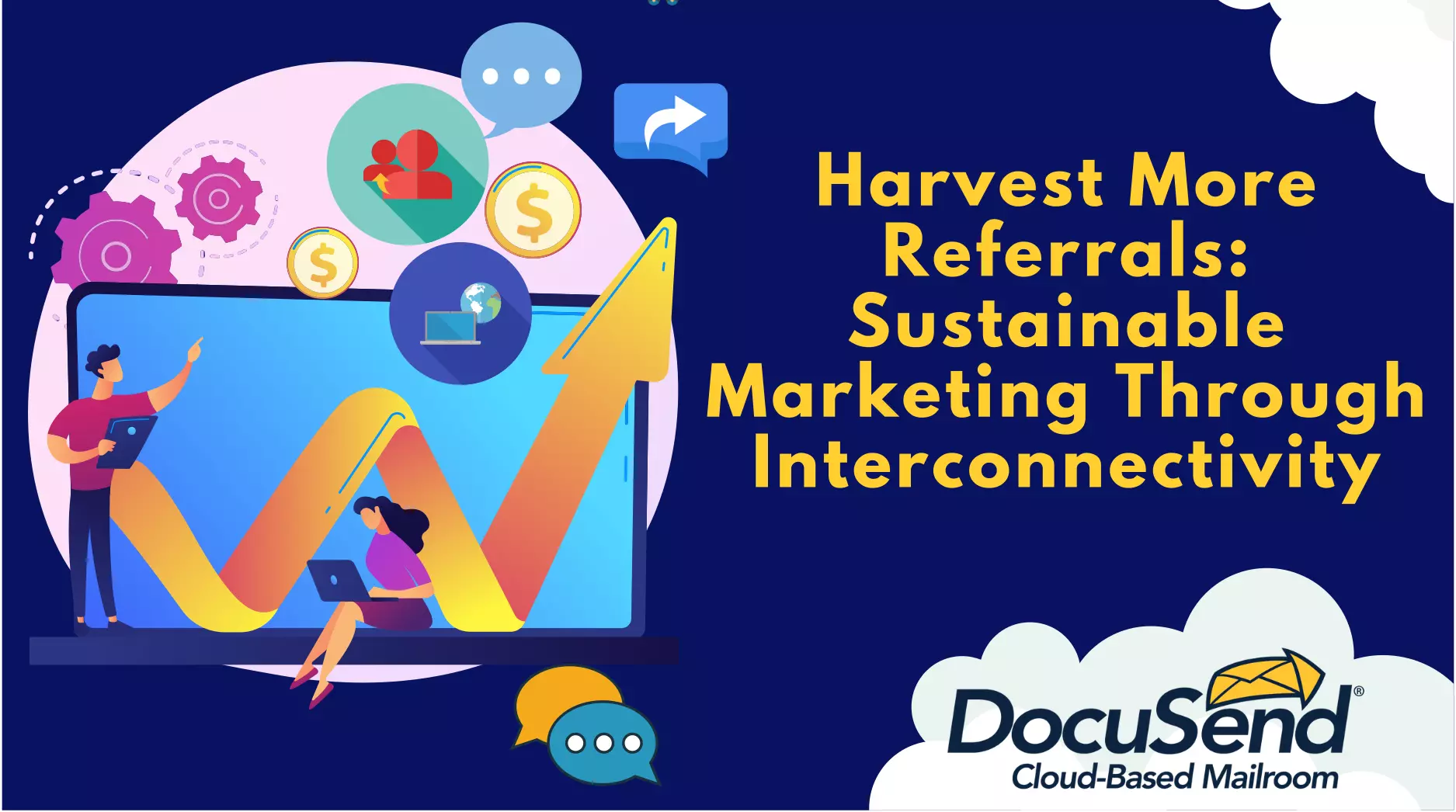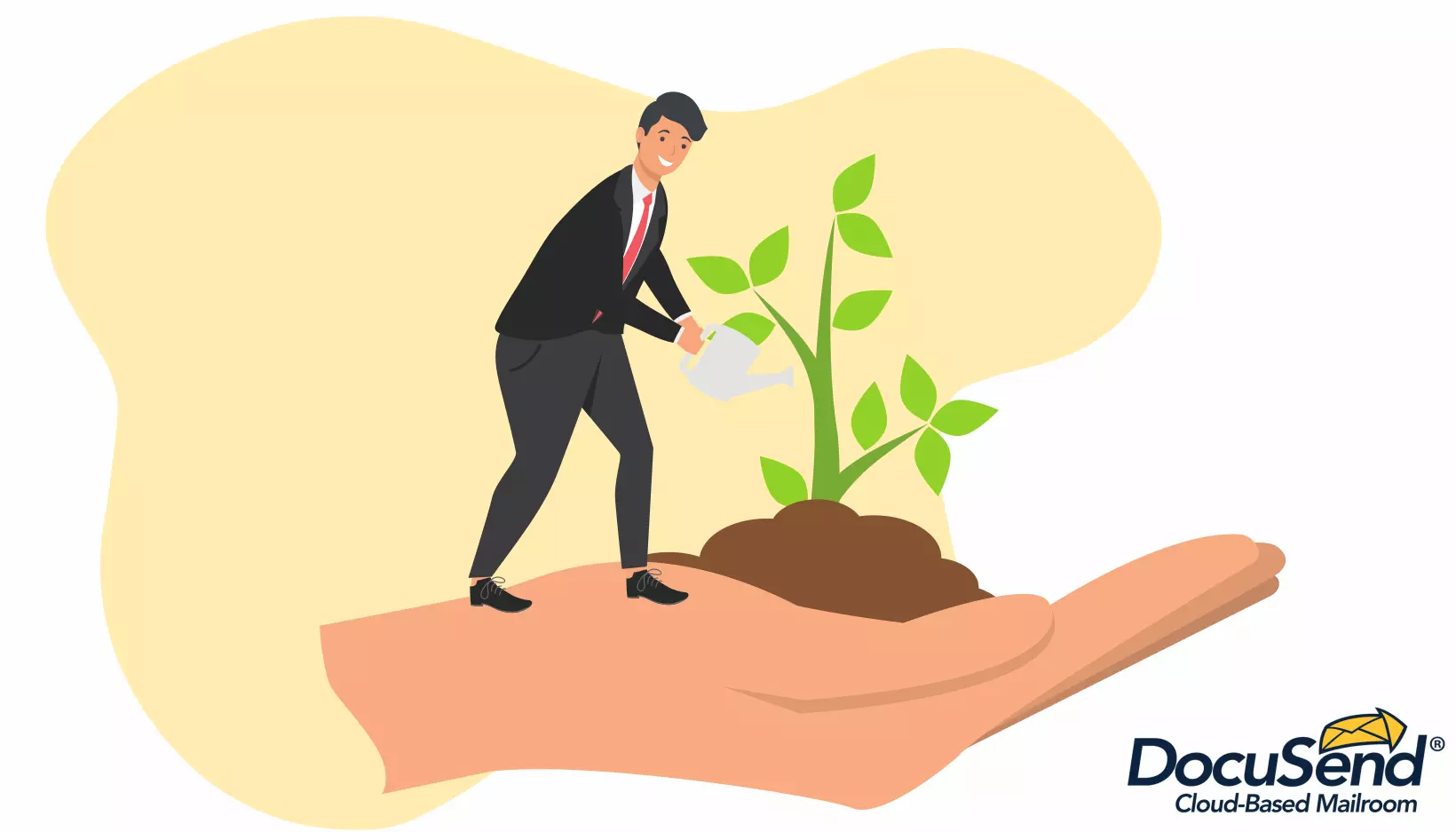Harvest more referrals: sustainable marketing through interconnectivity
Authored by: Fred Morgan, CTO, DocuSend, powered by MTI.
It used to be that advertising was mainly about beating down the doors. Sellers aggressively competed for our attention—that’s why we would get so much junk mail and so many dinnertime telemarketing calls. To use a gardening metaphor, how well a company cultivated client relationships was not as important as how much fertilizer they were dumping on the ground.
Kudos Count
As consumers became inured to the bombardment, more and more advertising dollars were spent on trying to get noticed. Customers needed another way to know whether a product was any good. About the same time, the internet was exploding into the general population, and with it, social media. Now, for almost any product or service, we can find out from those who’ve tried it—and sometimes expert reviewers—what they think of it.

In today’s climate, the most important thing is recognition from customers who use you.
Everyone says their own product or service is the best, and it has about as much credibility as politicians denying the problems they create and taking credit for successes. When others mention you in a positive way, it is worth far more than tooting your own horn.
Serve It Up
In their SEO rankings, Google and other search engines don’t care that you want to be noticed; they care that you are serving the public with information. And there’s no fooling their algorithms—you can’t be like a dictator who claims to be a servant of the people; you have to actually be one!
It may seem counterintuitive, but…
I learned this when I started a business planting trees in the tropics. I wasn’t trying to become a small business owner, I was just planting trees as part of my retirement plan. But friends thought that it was really cool, and since they couldn’t go start a reforestation project in Costa Rica, they wanted me to plant trees for them. Then my wife and I decided to open it up to anyone who wanted us to do the same. I built a website, and a few searchers became owners of trees on our plantations, but honestly, not much happened.
Just Write

I like to write stories about my experiences while adjusting to life in a foreign country. I don’t know why, but funny things happen to me that teach me things about the culture. (It may have something to do with my ineptitude at activities like riding horses and tree climbing.)
I posted these stories about once a month on a forum and on our website, and they developed a following. People would read them on the forum, and if it was the first time they had seen one of the stories, they would go to our website to read the earlier ones. Our website grew in popularity and rose in Google’s rankings as followers quoted from my humorous anecdotes, referred to the articles, and linked to pictures on our website. For a long time, the number one photo in Google if you searched on “Costa Rica images” was one I took of a secluded waterfall (and I’m no photographer).
As a result, the website brought clients who paid us to buy land and plant trees for them—160,000 trees in all.
The point is:
It all happened very naturally. You could say our company grew organically.
Will You Run Out of Things to Write About?
Not if you think about your business in its broadest terms. Because we were planting trees as part of a reforestation strategy, anything about trees, nature, and working with the locals was relevant. That gave everyone in the company a chance to add to the stories. Even visitors to the plantations contributed guest articles. The quirkier the situations described, the better.
All the wonderful things I was learning were great fun to share. Because of the articles, at one time, people thought I was a leading expert on reforestation in Costa Rica, when in truth, we hired forestry engineers who knew what to do! So, we decided to add some authoritative articles from a published forester.
How does this apply to your business?
As an example, if you do lawn care, share what you know about it. But wait—aren’t you giving away trade secrets? The truth is, how to care for a lawn isn’t exactly intellectual property. A quick search on the internet will yield lots of information. And you want to be one of the information sources people find. By helping the general public and not just targeting those most likely to use your service, you will attract more traffic to your site—and that traffic will move you up in the rankings, making it easier for those seeking lawn care services to find you. And don’t forget to link to your favorite informational sites written by experts in any area related to your business.
A Hidden Bonus
Here's another reason to share your knowledge:
I found that by reading about what I was discovering as the plantations progressed, people understood how difficult it was to do what we were doing and decided it was better if they just let us do it for them. Now, if you were to reveal all the things that give you an edge, it might not be the best thing to tell the world, but helping potential clients understand just how much value you are offering them is always a good thing.
Perma Business Culture

This is a lot like how the natural world works. The permaculture movement has been developing a lot of momentum. The idea is to make your garden function like a forest. No one applies fertilizer to a forest—it isn’t necessary. Nor do they continually spray. (They spray monoculture environments, or when an exotic pest or disease invades, but not normally.) This is because there is interconnectivity among the trees as well as between trees and other plants. Permaculture tries to recreate this interconnectivity. Artificial environments, like rows and rows of corn, require a huge investment in fertilizer to make them succeed. The problem is that, with time, the soil develops a toxicity due to the fertilizer (like consumers do when barraged with advertising!), and yields start to drop.
With permaculture, you feed the soil instead of feeding the plant. You feed the environment instead of feeding the crop. It seems like it wouldn’t work, like weeds would just take over, but it works great. Fertilizer is expensive, but this sustainable environment isn’t. Once you get it set up, which admittedly takes considerable effort, it pretty much just keeps rolling on its own.
How would this work for, again, a lawn care company?
Well, when a lawn care company collects debris from a lawn, they typically have two choices: they can haul it to a dumpsite and pay to get rid of it, or they can let everyone know they are willing to drop it off at their homes to be recycled into compost, used on gardens, etc. By letting the world know via your website that you offer this, it increases awareness of your services to those in the gardening community. Someone who’s into gardening may or may not take care of their own lawn, but they are likely to have friends and neighbors who ask them who they would recommend for lawn care services.
And yours will be the one that comes to mind.
By letting your waste help others, you have become part of a sustainable web, as you “feed your environment,” and those who benefit from your waste contribute to your well-being.
It's sustainable marketing through interconnectivity
I’d like to hear from you: How have you, or someone you know, used interconnectivity as a sustainable marketing tool for your small business? Let’s see how many creative ways all you enterprising people have come up with. Post your answers in the comments section below.

